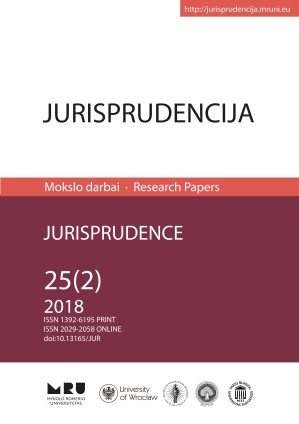VAIKŲ, SULAUKUSIŲ PILNAMETYSTĖS, IŠLAIKYMAS:
TEISINIS REGULIAVIMAS IR PRAKTIKA
MAINTENANCE OF ADULT CHILDREN: LEGAL REGUALTION AND ITS ENFORCEMENT
Author(s): Inga Kudinavičiūtė-Michailovienė, Vitalija ŠimkienėSubject(s): Education, Law, Constitution, Jurisprudence, Family and social welfare
Published by: Mykolas Romeris University
Keywords: child maintenance (support); adult in education; parental obligation; financial position;
Summary/Abstract: The article analyses the institute of maintenance for adult children in education, by covering the genesis of its regulation, the driving forces for change, the substance of the parental obligation to provide for their adult children, the importance of individual criteria, as well as the Lithuanian case law in this field. A specific provision regulating the parental obligation to provide maintenance for their adult children had been laid down in the Civil Code as early as 11 November 2004, however, the regulation was later expanded (by the law of 20 June 2013) into a separate article of the CC (Article 3.1921). At that time, an undeniable impact was produced by a ruling of the Constitutional Court, which stated that adjudgment of maintenance for adults cannot be based on the same principles as maintenance for minors. Moreover, legal regulation cannot be set up in such way, that it distorts the balance of rights and obligations by unconditionally transferring the burden of decisions taken by adult children (who are legally capable) upon their parents, regardless of their capacity, their obligations towards other persons (inter alia underaged children, other family members and dependents), without due consideration of their material wealth and actual capacity to provide such maintenance without damaging their own interests or those of other persons.The regulatory regime in power since 2013 establishes specific criteria, under which maintenance may be adjudged for adult children, i.e. their age or certain forms of education they are in. On the other hand, the legislator granted broad power of discretion to the courts, as regards additional criteria that might require case-by-case evaluation, such as the necessity of maintenance, or parents’ actual capacity to provide such maintenance. It should be noted that, even though a real need for maintenance may be confirmed, maintenance cannot be adjudged, if the parents have no actual capacity to provide it. In other words, the balance must always be preserved between various preconditions for the adjudgment of maintenance. Analysis or the corresponding case law suggests, that court practices vary significantly, because, as the courts enjoy their power of discretion, interpretation of case-specific preconditions does not guarantee absolute enforceability of the right to maintenance for an adult. On the other hand, breach of balance between the assessed preconditions often opens possibilities for abuse of the rights of the parents, who are allegedly obliged to provide maintenance.
Journal: Jurisprudencija
- Issue Year: 25/2018
- Issue No: 2
- Page Range: 435-464
- Page Count: 30
- Language: Lithuanian

